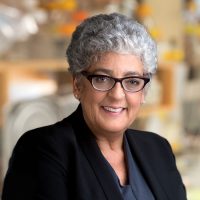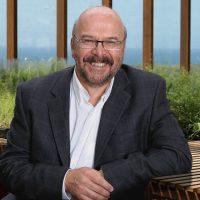
December 7, 2018
Three Salk researchers once again make the prestigious list of “Most Influential Scientific Minds” with papers ranking in the top 1 percent by citations
LA JOLLA—Salk Professors Joanne Chory, Joseph Ecker and Rusty Gage have once again been named to the Highly Cited Researchers list by Clarivate Analytics (formerly Thomson Reuters). The list selects researchers for “exceptional research performance” demonstrated by the production of multiple highly cited papers that rank in the top 1 percent by citations for field and year. Additionally, among the 4,058 researchers named as Highly Cited, Ecker is one of 194 researchers appearing in two separate categories: “plant and animal science,” as well as “molecular biology and genetics.”
“The advancement of scientific endeavor represents a critical activity for individual research institutions and entire nations,” says Annette Thomas, CEO of the Scientific & Academic Research group at Clarivate Analytics. “The Highly Cited Researchers 2018 list helps to identify the researchers who are having the greatest impact on the research community as measured by the rate at which their work is being cited by others and that contributes so greatly to extending the frontier and gaining knowledge and innovations for society—contributions that make the world healthier, safer, richer and more sustainable.”
Such consistent production of highly cited reports indicates that the work of these researchers has been repeatedly judged by their peers to be of notable significance and utility, as based on data from the Web of Science, the world’s largest publisher-neutral citation index, with over 1.4 billion cited references going back to 1900. This year’s list, which includes 17 Nobel laureates, recognizes researchers across multiple fields whose citation records position them in the highest ranks of influence.
The Salk trio have been named to this list every year since 2014—when the regular annual rankings began—for their contributions to plant biology, genetics and neuroscience.

Joanne Chory
Click here for a high-resolution image.
Credit: Salk Institute
Joanne Chory
Chory, who is a professor and director of Salk’s Plant Molecular and Cellular Biology Laboratory, a Howard Hughes Medical Institute investigator, and holder of the Howard H. and Maryam R. Newman Chair in Plant Biology, is one of the world’s leading plant researchers. She has won numerous awards in her field—most recently, Chory received a $3 million Breakthrough Prize for trailblazing work deciphering how plants optimize their growth, development and cellular structure to transform sunlight into chemical energy. She was also the recipient of the 2018 Gruber Genetics Prize for her groundbreaking research to identify the basic regulatory and biochemical mechanisms underlying the development of plants. Chory is currently spearheading Salk’s Harnessing Plants Initiative—a bold effort to pioneer the use of plants to absorb increased amounts of carbon to help stem global warming. Her latest paper in Nature Communications characterized an unusual plant immune response to bacterial infection. She is a member of multiple scientific societies, including the National Academy of Sciences, the American Academy of Arts and Sciences, the American Philosophical Society and the Royal Society of London.

Joseph Ecker
Click here for a high-resolution image.
Credit: Salk Institute
Joseph Ecker
Ecker, a professor in Salk’s Plant Molecular and Cellular Biology Laboratory and director of the Genomic Analysis Laboratory, is a Howard Hughes Medical Institute investigator. He is one of the nation’s leading authorities on the epigenetics of plants and people, and also holds the Salk International Council Chair in Genetics. Since 2017, he has been the principal investigator of a $25 million National Institutes of Health BRAIN initiative grant to develop an atlas of brain-cell types. More recently, he is a participant in a $19.2 million grant from the American Heart Association-Allen Initiative in Brain Health to study Alzheimer’s disease and brain aging. He recently published a paper in Science describing his lab’s identification of new subtypes of brain cells. In addition to receiving numerous scientific accolades, Ecker also belongs to many scientific societies, such as the National Academy of Sciences, the American Academy of Arts and Sciences, and the American Association for the Advancement of Science.

Rusty Gage
Click here for a high-resolution image.
Credit: Salk Institute
Rusty Gage
Since last appearing on the Highly Cited Researchers List, Gage, a professor in the Laboratory of Genetics and holder of the Vi and John Adler Chair for Research on Age-Related Neurodegenerative Disease, has been named president of the Salk Institute. In addition to that role, he is leading a team of 10 Salk researchers awarded a $19.2 million American Heart Association-Allen Initiative in Brain Health grant to pursue new insights into Alzheimer’s disease. Gage’s work concentrates on the adult central nervous system and the unexpected plasticity and adaptability to environmental stimuli that mammals retain throughout life. He also models human neurological and psychiatric disease in vitro using human stem cells, and recently published a pioneering approach to develop more-sophisticated brain organoid models, detailed in Nature Biotechnology. Aside from being the recipient of many scientific awards, Gage also belongs to several scientific societies, including the American Academy of Arts and Science, the National Academy of Medicine and the National Academy of Sciences. He previously served as the president of the Society of Neuroscience.
Office of Communications
Tel: (858) 453-4100
press@salk.edu
Unlocking the secrets of life itself is the driving force behind the Salk Institute. Our team of world-class, award-winning scientists pushes the boundaries of knowledge in areas such as neuroscience, cancer research, aging, immunobiology, plant biology, computational biology and more. Founded by Jonas Salk, developer of the first safe and effective polio vaccine, the Institute is an independent, nonprofit research organization and architectural landmark: small by choice, intimate by nature, and fearless in the face of any challenge.